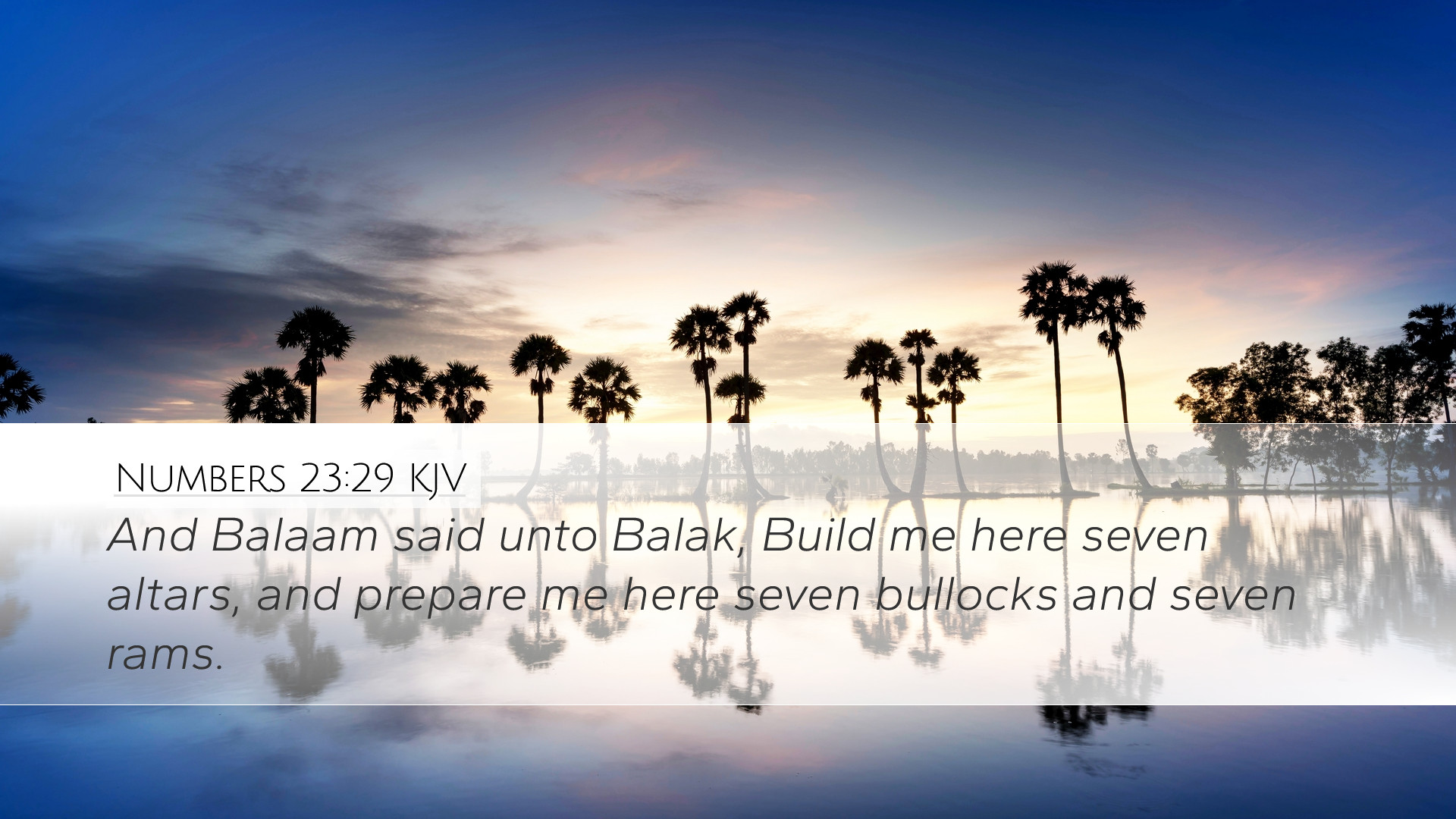Commentary on Numbers 23:29
Numbers 23:29 states: "And Balaam said unto Balak, Build me here seven altars, and prepare me here seven oxen and seven rams." This verse marks a significant moment in the interaction between Balaam and Balak where ritual and sacrifice play pivotal roles in the unfolding narrative of Israel's journey. Drawing from the insights of several public domain commentaries, we delve into the multi-faceted implications of this verse, exploring its theological, cultural, and narrative contexts.
Context and Background
The setting of this verse occurs within a broader narrative where Balak, the king of Moab, seeks to undermine the Israelites by hiring Balaam, a diviner, to curse them. Understanding the cultural backdrop of ancient Near Eastern practices—particularly the role of sacrifices and altars—adds depth to the actions taken by Balaam.
The Significance of Altars
According to Matthew Henry, the construction of altars was central to ancient worship and often represented connection points between heaven and earth. In this instance, Balaam's demand for seven altars signifies a serious intention to invoke divine assistance, reflecting an awareness of the power and authority of the God of Israel.
- Seven as a Symbolic Number: The choice of the number seven often represents completeness or divine perfection in biblical numerology. This suggests that Balaam intended to approach God with a full measure of reverence, attempting to align with the proper forms of worship.
- Preparation of Sacrifices: Balaam's request for seven oxen and seven rams indicates he recognizes the necessity of sacrifice in establishing a covenantal relationship with God. This aligns with the notion presented by Albert Barnes, who elaborates on the significance of blood offerings as a means to atone for sin and seek favor from the divine.
Balaam’s Role as a Prophet
Adam Clarke emphasizes that Balaam, despite being a non-Israelite prophet, exhibits an understanding of the God of Israel's requirements and ways. This duality of Balaam’s character—both as a mercenary for hire and a prophet who knows the power of God—serves as a cautionary tale about the dangers of spiritual compromise and the mixed motives that can lead one away from true obedience.
Theological Implications
This verse illustrates the complexity of divine interaction within human affairs. Although Balaam seeks to proclaim a curse upon Israel, the rituals he engages in indicate a misunderstanding of God's sovereignty, as Balak assumes he can manipulate God through sacrifices. The theological implications presented by Matthew Henry encourage readers to reflect on the sovereignty of God juxtaposed with human attempts to control outcomes through religious ritual.
- God’s Sovereignty: The overarching narrative asserts that no amount of ritualistic adherence can subvert the will of God. This reiterates the belief that God ultimately uses even flawed individuals like Balaam to accomplish divine purposes.
- The futility of Cursing God's People: This passage foreshadows the futility of Balak's intentions, as God’s chosen people are under his protective influence, highlighting the theme of divine favor and judgment that permeates the entirety of scripture.
Practical Lessons for Today
For pastors, students, and theologians, Numbers 23:29 serves as a rich text to explore practical lessons in relation to faith, obedience, and worship:
- Authenticity in Worship: The necessity for genuine engagement with God rather than mere ritualistic observance is underscored. Believers are reminded of the importance of the heart's condition when approaching God.
- Understanding God’s Purpose: The text invites contemporary readers to reflect on their own motivations and align them with God's desires rather than seeks to manipulate the divine for personal gain.
- The Call to Trust: In a world that often feels chaotic, this passage encourages modern believers to trust in God's plan, recognizing that His will cannot be thwarted by human schemes.
Conclusion
In summary, Numbers 23:29 invites deep theological reflection on themes of worship, the gravity of sacrifice, and the undeniable sovereignty of God. As one considers the actions of Balaam in this verse, the implications for personal faith and communal worship are profound. It serves as both a warning and an encouragement, illustrating that while rituals may express devotion, true faith is rooted in an understanding of God’s character and promises.


